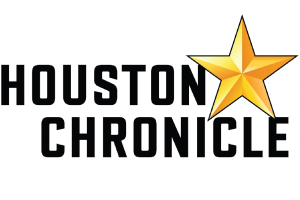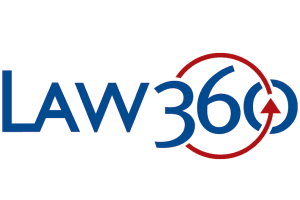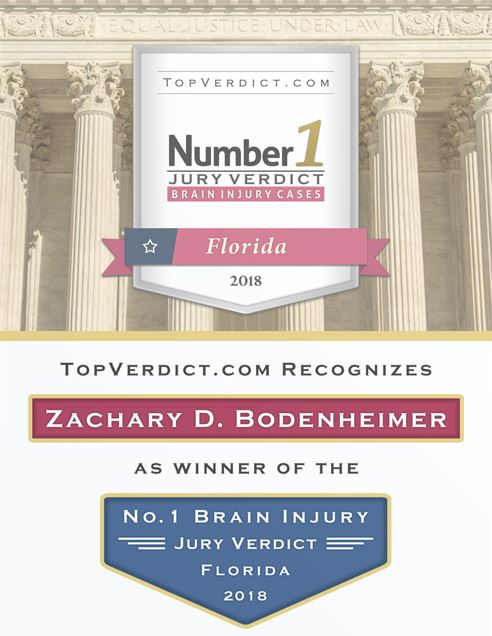Miami Brain Injury Lawyer
Millions Recovered in Serious Injury Claims in Florida
At Flanagan & Bodenheimer Injury & Wrongful Death Law Firm we take traumatic brain injury cases very seriously. Our team of Miami brain injury attorneys have experience handling these cases at the highest level. Our lawyers have recovered many multi-million dollar wins for brain injury victims – including the largest brain injury verdict in the State of Florida in 2019. We are here to help if you or a loved one have sustained a brain injury caused by the careless or negligent actions of another person, whether it be a driver, medical professional, or property owner. You can trust our traumatic brain injury attorneys to conduct a complete investigation of your case and to help guide you through the recovery process.
Contact our brain injury lawyers online or call (305) 638-4143 for a free consultation. We purposely maintain a small caseload in order to provide dedicated, one-on-one support for every client.
Table of Contents
- How Brain Injuries Occur in Accidents
- What Type of Brain Damage Occurs in Accidents?
- Types of Brain Injuries
- Side Effects of Concussions & Brain Injuries
- Can Any Personal Injury Lawyer Handle My Brain Injury Case?
- Flanagan & Bodenheimer Brain Injury Cases
- Primary Causes of Brain Injuries in Florida
- Traumatic Brain Injury Statistics
- Free Consultation With a Miami Brain Injury Lawyer
How Brain Injuries Occur in Accidents
The brain is a very soft and fragile organ that has a consistency that some have compared to Jell-O. Throughout the brain matter there are millions of nerve fibers called neurons. The nerve fibers resemble strands of silk. The neurons transmit electrical signals and vital nutrients to the different areas of the brain.
The brain is suspended inside the human skull by fluid that keeps the brain from hitting against the inside of the skull. However, when there is a hit to the head or the body that causes the head to move rapidly, the brain can strike the inside of the skull or twist around inside of the skull. Because the brain is so fragile, this impact or twisting inside of the skull can cause stretching or tearing (more information on this below) of the nerve fibers and damage to the brain cells. Any traumatic injury to the brain can cause a chemical change in the brain leading to worsening brain damage. We will discuss this in greater detail below.
According to the CDC, falls and motor vehicle crashes are the first and second leading causes of concussions and traumatic brain injuries. Some people may think their head is protected in a motor vehicle crash if they are wearing their seatbelt. Unfortunately, that is not the case. For example, imagine a vehicle moving 45mph in a straight direction when another vehicle turns in front of them. When the collision occurs, the vehicle moving 45mph will be slowed significantly, causing the head to move forward through momentum. Then as the seatbelt holds back the driver’s body, the head will forcefully move backward, striking against the headrest. This violent movement by the brain inside the skull can cause structural damage to the brain because part of the nerve fibers between the cells can be torn.
What Type of Brain Damage Occurs in Accidents?
There are many different types of brain cells. However, the type of brain cell most frequently injured in accidents is called a neuron. Everyone has billions of neurons. The neurons have a cell body that is covered with receptors (called dendrites) and a long tail (called an axon) with many receptors at the end (called dendrites).
Every neuron connects to hundreds of other neurons in your brain. Axons are very important because they carry signals and vital nutrients throughout the brain. Every axon has hundreds or thousands of connections. When you suffer axonal injury, those connections are lost or damaged. That results in a disruption of the vital nutrients to parts of your brain and loss of the neural pathway. Once this happens brain cells will die. It is important to remember that the brain does not regenerate. Once the brain cells die, they are gone forever.
Every task you perform and thought you have causes electrical and chemical signals to travel through different neural pathways (along neurons and axons). As you become more skilled at performing a task the connections between those neurons and axons strengthen. If you suffer an injury to your brain and an important neural pathway is damaged, you may lose the ability to perform certain tasks. In severe cases, people may have to try to re-learn how to read or how to speak because the neural pathways they used for those skills were damaged.
Types of Brain Injuries
There are three main types of traumatic brain injuries:
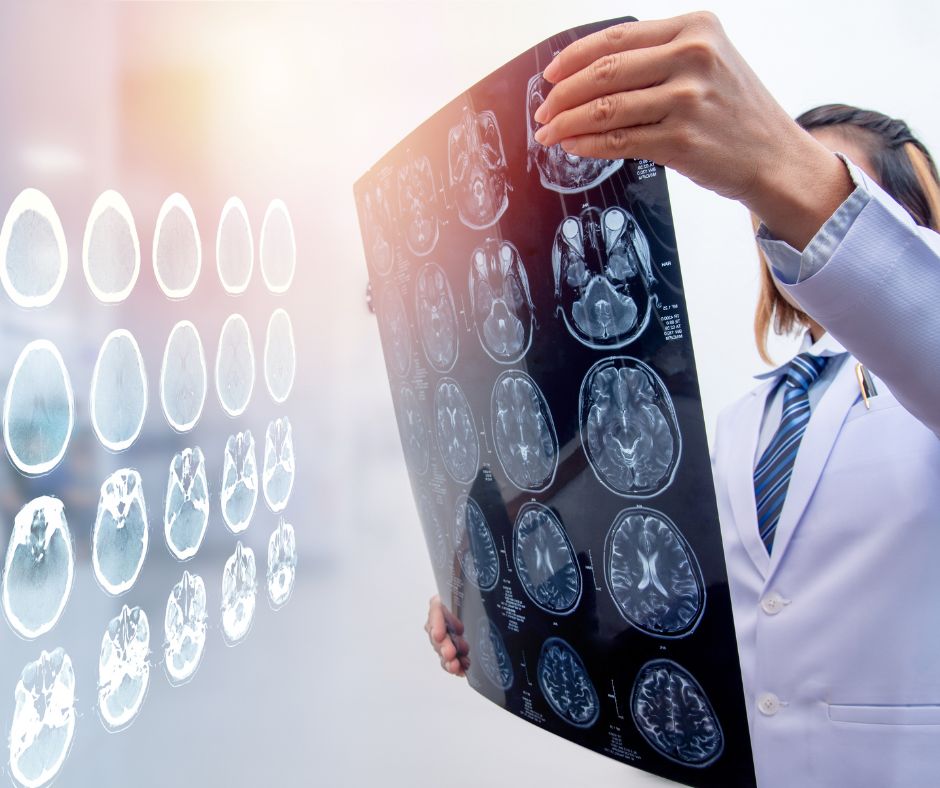
- Mild TBI / Concussion: Typically occurs due to a brief loss of consciousness or altered mental state following a head injury. They are considered less severe, but can still result in significant cognitive and emotional impairments.
- Moderate TBI: Typically involves prolonged unconsciousness and a range of cognitive and physical deficits. They involve more substantial damage to the brain and can lead to longer-lasting impairments.
- Severe TBI: Lead to profound, long-term disabilities and usually stems from catastrophic accidents.
Side Effects of Concussions & Brain Injuries
Immediate Symptoms:
- Impaired Attention: vacant stare, delayed responses, inability to focus
- Slurred or incoherent speech
- Gross incoordination
- Disorientation
- Emotional reactions out of proportion
- Memory deficits
- Any loss or alteration of consciousness
Within One Hour to Days:
- Persistent headaches
- Dizziness/vertigo
- Poor attention and concentration
- Memory dysfunction
- Nausea or vomiting
- Frequent vatigue
- Irritability
- Intolerance of bright lights
- Intolerance of loud noises
- Anxiety and/or depression
- Sleep disturbances
Long Term Consequences:
- Difficulty thinking and remembering
- Difficulty performing tasks
- Confusion
- Speech and language defects, such as slurred speech and problems reading or communicating, becoming derailed during conversation (losing train of thought), forgetting what was being discussed, and difficulty maintaining attention during conversation
- Vision disturbances (seeing spots, sensitivity to light, double vision, blurry vision)
- Mood disorders, such as depression and anxiety, emotional lability, emotional outbursts, use of profanity when out of character
- Sleep disorders, difficulty falling and staying asleep, falling asleep at inappropriate times
- Loss of fine motor skills
- Difficulty with coordination
- Difficulty with balance
- Dizziness
- Changes in personality
- Sensitivity to loud noises
- Headaches
Can Any Personal Injury Attorney Handle My Brain Injury Case?
Brain injury cases are complex and proving a brain injury case in court can be challenging. You should look to hire an attorney who has experience handling brain injury cases. Your lawyer should be knowledgeable about brain injuries and should be familiar with the most current peer-reviewed literature regarding brain injuries. If you need prove your case in Court, your lawyer will have to cross-examine medical experts about your injuries. You want to have a team of lawyers that are on the cutting-edge of brain injury medicine. In addition, your brain injury lawyer should have a team of medical experts ready to help you do your best to make a full recovery from your brain injury.
This means that you should be seen by a neurologist with specialized knowledge and experience handling brain injuries, a neuropsychologist, a neuroradiologist, a physical therapist, and in some cases a brain injury medicine certified physiatrist. Many times, medical professionals (and attorneys) don’t pay close enough attention to a person’s symptoms and fail to identify a brain injury until months or years after it has occurred. You want to make sure that your legal and medical team are on the ball and ready to help you recover from your injury and prove your case.
Remember, you only have one case and one chance to prove your case. Make sure you have a brain injury attorney on your team who knows what they are doing.
Flanagan & Bodenheimer Brain Injury Cases
If you have suffered a concussion or brain injury that is a result of someone else’s negligence, don’t hesitate to reach out to our brain injury lawyers. We have experience handling these types of serious injury cases and know how to collect and preserve evidence that will demonstrate the injury. Below are just some of our victories for brain injury victims in Florida:
- $10,500,000 verdict for victim of brain injury in car crash (largest brain injury verdict in Florida in 2019)
- $3,750,000 result for man who slipped and fell in a restaurant causing a concussion
- $2,750,000 result for a woman who suffered a concussion
- $2,368,934 result for woman who suffered concussion in a car crash
Primary Causes of Brain Injuries in Florida
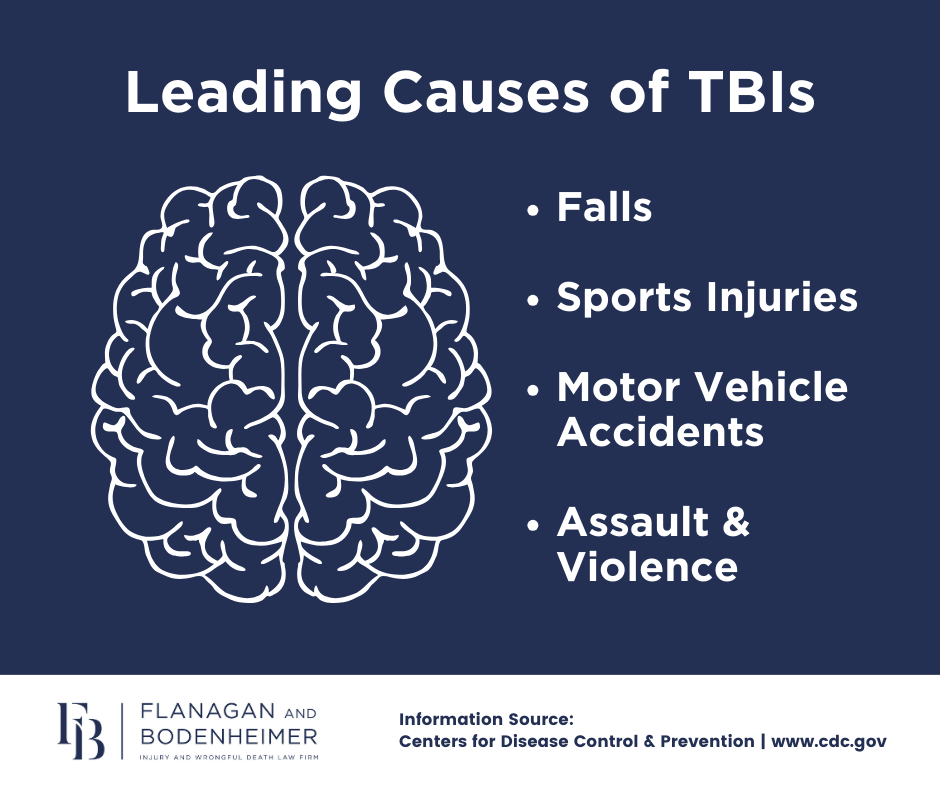
Several factors contribute to the prevalence of traumatic brain injuries in Florida, including:
- Motor Vehicle Accidents: Motor vehicle accidents, including car crashes and motorcycle collisions, stand as a primary cause of traumatic brain injuries in Florida. The force and impact involved in these accidents can cause significant head trauma, leading to brain injuries ranging from concussions to severe forms of TBI. The high volume of traffic in Miami, coupled with factors such as reckless driving, drunk driving, or distracted driving, increases the risk of motor vehicle-related brain injuries.
- Brain Injuries from Assault: Violent acts, such as assaults and gunshot wounds, are prevalent causes of traumatic brain injuries in South Florida. These intentional acts of harm can result in severe head trauma and life-altering brain injuries. Violence-related brain injuries require immediate medical attention and long-term rehabilitative care.
- Slip and Fall Accidents: Brain injuries from slip and fall accidents occur when individuals lose their balance or encounter hazardous conditions, leading to falls that impact the head. Slip and fall accidents can happen in various settings, including public places, workplaces, or private properties. Factors such as wet or slippery surfaces, uneven flooring, inadequate lighting, or insufficient safety measures contribute to these accidents and subsequent brain injuries.
- Sports Related Brain Injuries: Practicing sports carries inherent risks, and Miami’s vibrant sports culture contributes to a significant number of sports-related brain injuries. Contact sports, such as football, or boxing, pose a higher risk of head trauma and brain injuries. Even non-contact sports, such as soccer or basketball, can lead to falls, collisions, or impacts that result in TBIs. Proper safety equipment, training, and adherence to safety protocols are crucial in minimizing the occurrence and severity of sports-related brain injuries.
The impact of these incidents can be life-changing, affecting individuals physically, emotionally, and financially. If you or a loved one has suffered a brain injury due to someone else’s negligence, seek legal representation from an experienced traumatic brain injury lawyer.
Statistics: The Impact of Traumatic Brain Injuries (TBIs)
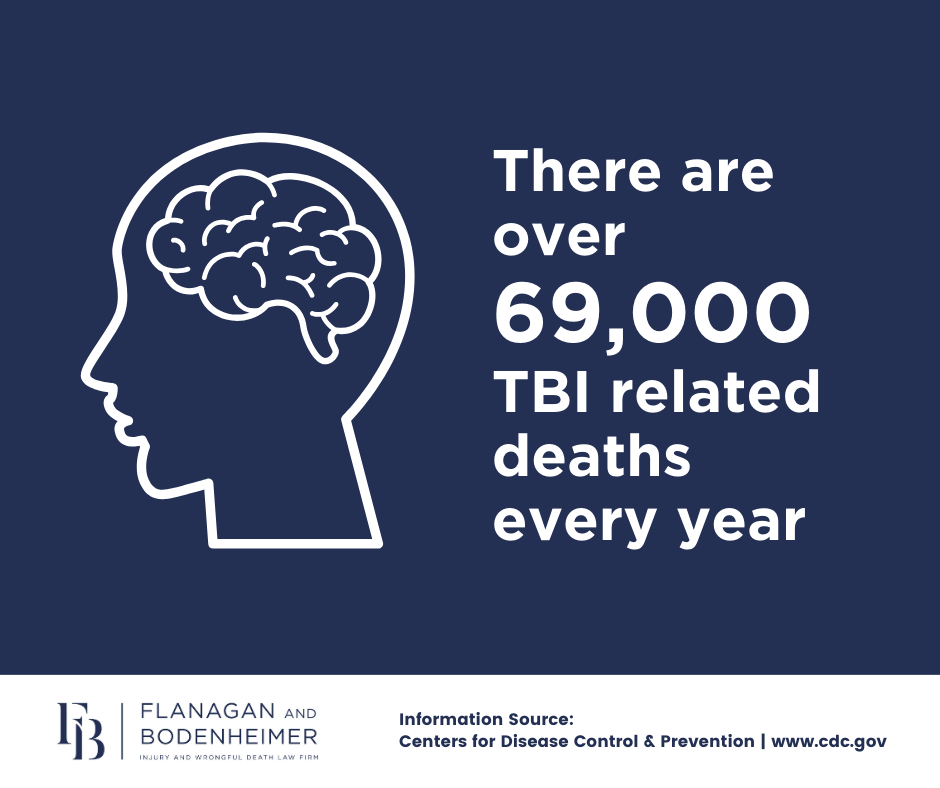
The statistics surrounding traumatic brain injuries (TBIs) in the United States are concerning. Let’s delve into the numbers, focusing on TBI-related hospitalizations and deaths, and age group prevalence.
In 2019, there were approximately 223,135 TBI-related hospitalizations in the US according to the CDC. Additionally, in 2021, there were 69,473 reported TBI-related deaths, highlighting the impact these injuries can have on mortality rates. These figures translate to more than 611 TBI-related hospitalizations and 190 TBI-related deaths occurring each day. This emphasizes the ongoing need for effective prevention, treatment, and support for individuals affected by traumatic brain injuries.
It’s important to note that these numbers do not account for TBIs that are solely treated in emergency departments, primary care settings, urgent care facilities, or those that go entirely untreated. This suggests that the actual occurrence of TBIs may be significantly higher than reflected in hospitalization and mortality data alone.
Elderly people 75 years old and above experience the highest numbers and rates of TBI-related hospitalizations and deaths. This age group accounts for approximately 32% of TBI-related hospitalizations and 28% of TBI-related deaths, signifying the vulnerability of older individuals to these traumatic injuries.
Behind these statistics are real individuals whose lives are forever altered by traumatic brain injuries. If you or someone you know has experienced a TBI due to another party’s negligence or misconduct, seek legal representation from a traumatic brain injury lawyer. Our attorneys can provide the guidance and support needed to pursue compensation for the physical, emotional, and financial toll inflicted by these injuries.
Contact Our Miami Brain Injury Lawyers
Our brain damage attorneys have the resources and legal experience necessary to thoroughly investigate the case. This allows us to:
- Ensure our clients are seen by a trusted brain injury experts who can fully evaluate the severity of the injury
- Obtain any evidence necessary to prove liability, including video or photo surveillance, statements from eyewitnesses to the incident, accident reports, and more
- Negotiate with every party involved to reach a fair settlement on behalf of the client, or prepare the case for trial if necessary to secure compensation
This will likely be your only traumatic brain injury case. Don’t trust it to a lawyer or law firm without a track-record of experience earning top-dollar results for brain injury victims. Contact our brain injury attorneys for a free and confidential consultation.
Our personal injury and wrongful death law firm has sought justice for clients throughout Florida. We proudly cater to a wide range of areas, including but not limited to Coral Gables, South Miami, Homestead, Aventura, Sunny Isles, Brickell, North Miami Beach, Kendall, Miami Gardens, Pembroke Pines, Cutler Bay, Hollywood, Boca Raton, and Fort Lauderdale.
Don’t wait until it’s too late—call our Miami brain injury lawyers to schedule your free consultation today at (305) 638-4143.









